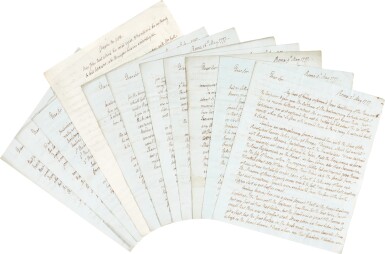
Joseph Denham | Series of 108 letters to Sir William Hamilton, on Napoleon's invasion of Italy, 1796-97
Lot Closed
April 13, 01:28 PM GMT
Estimate
12,000 - 18,000 GBP
Lot Details
Description
Joseph Denham
Series of 108 autograph letters signed, to Sir William Hamilton,
providing regular and detailed intelligence of Napoleon's invasion of Italy, his advance south and the response of the authorities and people of Rome to the growing threat, ending just four days before the city's fall to the French, with enclosures including Denham's autograph manuscript satirical history of "John Bull [Britain] & Lewis Baboon [France]" ("A Continuation of the History of John Bull"), most letters with integral address panels, c.300 pages, 4to, Rome, 23 December 1796 to 6 February 1798; some light marginal fraying
[with:] William Wyndham, two autograph letters signed, to Hamilton, Florence 18-19 July 1799
“…I have already informed your Excellency that the French troops had entered Venice, where Buonaparte himself now is, so that we shall soon hear the fate of the state. The Pope's Nephew had five millions of Crowns deposited there, which are now supposed to be totally lost. The most serene Government of Genoa has sent an Agent to Paris to propose to that Directory the reduction of their Republic into a Democracy & to make it a province of France…”
An unpublished correspondence providing information on Napoleon's invasion of Italy in 1797. Joseph Denham (b. c.1741) was a British merchant who had been settled in Italy since the 1760s. He was wealthy and successful with a business in the port of Civitavecchia, a home in Rome, and a country estate (see John Ingamells, A Dictionary of British and Irish Travellers in Italy, 1701-1800 (1997), p.291). He also, as these letters show, provided regular news and intelligence to Sir William Hamilton, the longstanding British ambassador to the Kingdom of Naples. The two were evidently long-standing friends – for example Denham writes warmly of Sir William’s wife Emma Hamilton ("…she is always in my thoughts, & I talk about her wherever I can…", 26 December 1797) – but the letters are occupied with news of Napoleon’s advance through northern Italy. The letters open when Napoleon was still occupied with the siege of Mantua, but after the city and its garrison surrendered on 2 February 1797 the French began to march ever closer towards Rome. Denham reports on the conquest of Venice, the establishment of new French client states ("...The Cispadan Constitution is now published & contains 404 Articles - generally consistent to that of France...", 24 March 1797) and the outbreaks of revolutions inspired by the French ("...A terrible Insurrection has happened at Genoa of the common people against the Government [...] They released all the Galley Slaves, seized the Cannon & Arms, & committed great outrages…", 2 June 1797).
Denham is particularly concerned with the response of the Papal States to the growing threat from France. In the earliest letter in the series he reports that “7000 French troops are arrived & are to march directly to Faenza in the Romagna to try what metal the Pope's Troops are made of, so we shall soon hear the result.” He writes about the changing mood in Rome as the Austrians are defeated and the French advance south ("…This is a fine opportunity for a Philosopher to observe the Hopes & Fears that agitate all the Romans…", 26 September 1797), the poor health of the Pope, and the growing focus of attention on the new French ambassador to Rome, Joseph Bonaparte. He sends Hamilton the texts of treaties, constitutions, proclamations and edicts by which the French imposed new forms of government on Italy. By early 1798 Denham reports on rumours of Neapolitan support and attempts to negotiate with General Berthier, who is leading the French advance; the series of letters ends just four days before the French occupied the city.
PROVENANCE:
The Carl and Lily Pforzheimer Foundation; Sotheby's New York, 11 December 1989, lot 135
You May Also Like










